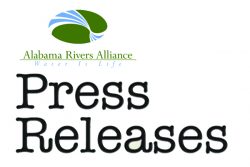PRESS RELEASE
FOR IMMEDIATE RELEASE
October 17, 2022
For more information, please contact: Kelly Marshall | [email protected] | 205-540-7385
ALABAMA’S FISH CONSUMPTION ADVISORIES FOR 2022
NOW AVAILABLE TOLL-FREE IN BOTH SPANISH AND ENGLISH
BIRMINGHAM, AL – The popular statewide toll-free fish consumption advisory hotline hosted by Coosa Riverkeeper, Alabama Rivers Alliance and Waterkeepers Alabama has been updated to feature the 2022 advisories and – for the first time – is also available in Spanish.
The Alabama Department of Public Health (ADPH), the agency producing the advisories, currently only distributes the advisories in English and online which does not account for any language, literacy, or technological barriers. After four years of only being available in English, Spanish-speaking communities can now call 844-219-7475 and hear the state-issued consumption recommendations for every waterway in Alabama in Spanish.
Earlier this summer, the Alabama Department of Public Health (ADPH) released its annual fish consumption advisories, which highlight the state’s recommended limits on the consumption of different species of fish found in Alabama’s rivers and streams. There are 227 advisories issued across 158 waterbodies in Alabama. After catching and testing certain types of fish, the state issues the consumption advisories to warn anglers NOT to consume fish that are contaminated with dangerous pollutants like polychlorinated biphenyls (PCBs) and methylmercury. Many of the advisories warn the public not to eat any fish from the specific waterbody, while others recommend limiting exposure to one or two meals per month. Given how important this public health information is for families relying on the river for sustenance, Waterkeepers Alabama decided to invest its own time and resources to translate its resources into Spanish.
“We’ve spent the last several years learning more about the anglers on our waterways throughout Alabama and we are excited to work with our partners to provide fish advisories in Spanish,” Victoria Miller, ARA’s advocacy assistant said. “We’re looking forward to talking to our legislators this coming session about other ways we can ensure those who eat the fish in Alabama know about the advisories and they can be certain they are protected as they participate in one of Alabama’s favorite pastimes.”
To learn more about the toxins in our fish and rivers, ways to reduce your exposure, and for more information about Fish Guide, please visit www.AlabamaRivers.org/FishGuide or see a map of the advisories for Alabama at WaterkeepersAlabama.org/Fish
Additional information, including photos and interviews, available upon request
# # #


